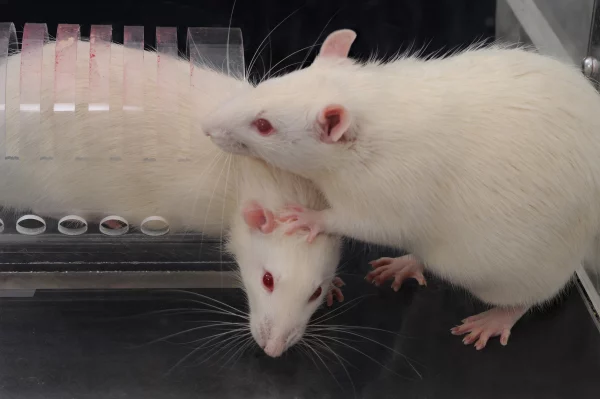In the animal kingdom, rats are often seen as creatures that live solely by instinct and have little ability to express emotions like humans. However, a recent study has revealed a surprising aspect of rats, showing that they are capable of helping their peers in difficult situations. This study was conducted by Professor Peggy Mason and colleagues at the University of Chicago and was published in the journal Science in 2011.
In the experiment, the scientists placed one rat inside a sealed tube with a door that could only be opened from the outside, while the other rat was allowed to roam freely. The goal was to observe whether the free rat would help its captive friend. After a few attempts, the free rat learned how to open the door to rescue its companion. Notably, the rat did not open the door for a stuffed toy rat or when the tube was empty, proving that the motivation to open the door was to help its companion, not out of curiosity or for material rewards.
This experiment demonstrated that the free rat prioritized rescuing its companion over seeking a material reward. The researchers tested another scenario where a tube containing chocolate was sealed. However, the free rat still prioritized rescuing its friend rather than enjoying the favorite treat. This result indicates that the act of helping is not only social but also reflects a deeper connection between individuals.

This study was published in the journal Science in 2011 and conducted by Professor Peggy Mason and colleagues at the University of Chicago. It is a clear example of empathy and mutual help in nature, something not all animal species are capable of.


HPX24h > Animals > Rats Help Each Other: When Compassion Emerges from Small Creatures
Top Reads from This Category
Animals
Decoding Whale Songs: When the Community Joins to Uncover the Ocean’s Mysteries
Animals
Ravens Use Gestures to Find Mates: A New Discovery About Their Intelligence
Animals
Unexpected Science: When Seismologists Listen to Underwater Earthquakes and Discover Whale Songs
Animals
Bee Wax Bust of Nefertiti: The Perfect Fusion of Art and Nature
Animals
Male Spiders Sacrifice Themselves to Protect Future Generations
Animals
Secrets to Surviving Antarctic Freezing Cold Through RNA Editing
Animals
Why Bedbugs Thrive Through Inbreeding
Discover New Topics
Science
NSF Workforce Cuts – Which Path Will the U.S. Take to Stay Competitive in the Global Tech Race?
Parenting Tips
How Much Sleep Do Children Really Need?
Science
The Secret of the Bee Brain: New Technology Enables Drones to Fly Independently
Science
Direct Brain-to-Brain Communication via the Internet
Science
NSF Cuts 168 Jobs Amid Booming Science and Technology: Paradox or Strategic Move?
Fitness
Cardiovascular Endurance: The Key to Optimizing Overall Health
Animals
Gibbons Develop Vocal Techniques as Powerful as Humans: New Discoveries About Their Unique Sounds
Science
Extinct Black Rhinos Could Make a Comeback with Genetic Technology
Health
Unlocking the Mystery: How the Brain Controls Body Weight
Space
Exploring a New Super-Earth: Could It Support Life?
Space
18 New Planets: Unlocking the Gateway to Exploring Giant Star Systems
Fitness
The Secret to Holistic Health: Aerobics and Its Role in Preventing Cardiovascular Disease
Science
Artificial Intelligence Outperforms Humans in Treating Depression